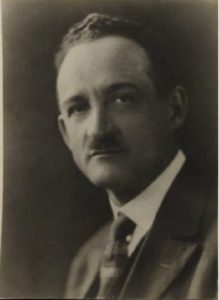
Edward C. Williams
*Edward Williams was born on this date in 1871. He was a Black librarian and educator.
Edward Christopher Williams was born in Cleveland, Ohio, the only son of an interracial marriage between Daniel Williams and Mary (Kilary) Williams of Tipperary, Ireland. He received his primary and secondary education from the public schools of Cleveland. In 1892, he graduated from Adelbert College of Case Western Reserve University as valedictorian of his class and a member of Phi Beta Kappa. He also played on the varsity baseball team.
After graduation, he became the Assistant Librarian at his alma mater, where he taught courses in collection development. In 1898, he was promoted to Library Director at Case Western Reserve University and took time off to attend the New York State Library School in Albany. After completing the two-year master’s degree program in one year, Williams returned to the University and continued to serve. When Case Western Reserve established the Library School in 1904, Williams taught courses in Reference Work, Bibliography, Public Documents, and Book Selection. In addition to his teaching responsibilities, he was a founding member of the Ohio Library Association (OLA) and lectured at the Ohio Institute of Library workers, which held its annual meetings each year at OLA.
In 1902, he married Ethel Chestnut, the eldest daughter of a Black writer, Charles Chesnutt. They had one son. For reasons unknown, Williams left the University in 1909 to become the Principal of the M Street High School (later named Dunbar High School) in Washington, DC. Seven years later, he accepted the Head Librarian position at Howard University and stayed there for thirteen years. While there, he increased the budget, improved the collection, and directed the library's training class. Simultaneously, as a Professor of German and Romance Languages, he taught Italian, French, and German. Earlier in his career, he translated French, German, Italian, and Spanish documents.
At one time, he received an offer to become a translator of Italian and Spanish documents for a collection published by the A. H. Clark Company. Although Williams was passionate about libraries and languages, he also nurtured the Black renaissance in Washington. In addition to his three dramas, poems, and articles, he committed himself to establishing and supporting literary groups. Through them, he would fight for his cause: racial tolerance in American society. Shortly after his arrival in the City in 1909, the Librarian joined the Mu-So-Lit Club, initially established in 1905 for black males of the "high class." Among their various topics, members of this organization liked to discuss literature. In 1911, the Club honored the memory of poet Paul Lawrence Dunbar. Williams helped organize this effort. Williams believed that Black authors should address social and political inequities in their works.
In 1916, he helped form a drama committee for the local NAACP. The same year, the committee sponsored a showing of Rachel, a play by Angelina Grimke that emphasized the evils of lynching. During the 1920s, he wrote the Exile, an Italian classical drama in two acts; the Sheriff’s Children, an adaptation of Charles Chestnut's work by the same title; and The Chasm, a drama. From 1925 to 1927, he authored a series of articles based on the flaws of Washington’s black society entitled "Letters of Davy Carr, A True Story of Colored Vanity Affair." These articles appeared in the Messenger.
He also published poems and short stories, often anonymously and under the pseudonym of Bertiuccio Dantino. Light-complected enough to "pass" for white, Williams acknowledged his African heritage and faced racial intolerance. By the end of World War I, Williams became more resolved in his efforts. In 1918, he formed the Literary Lovers, a social club whose members would focus on "race or group consciousness." He introduced poet Carrie Clifford to the mixed-gender group. In keeping with the historic protest theme of black literature, Clifford's 1922 collection of poetry, The Widening Light, meshed with Williams' objective of "social equality, political rights, and cultural parity.” In 1921, Williams almost became affiliated with the efforts of Jean Toomer. Like Langston Hughes, Toomer not only disliked Washington's racial segregation but also found fault with the caste condition of Black Washington. Toomer wanted to establish a group of mulattoes whose members would study and deal with issues within the race.
Although Williams took part in a meeting, the group never jelled. Williams continued to juggle his library work with that of his literary pursuits. He took leave from Howard in 1929 to study for a Ph.D. in Library Science at Columbia University. Edward Christopher Williams' career was cut short by a sudden illness that claimed his life on December 27, 1929, at Freedman's Hospital. Three days later, Howard's President, Dr. Mordecai Johnson, presided over the funeral at Andrew Rankin Memorial Chapel on campus. The Librarian was buried at Lincoln Cemetery in Suitland, Maryland.